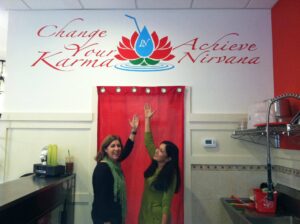 After more than 20 years in information technology (IT) at Aetna, including starting and running an IT recruiting company, Rosy Kapur was ready for a change. MetroHartford Alliance Content Manager Nan Price spoke with Rosy about her transition to business ownership—and enjoyed a delicious juice blend.
After more than 20 years in information technology (IT) at Aetna, including starting and running an IT recruiting company, Rosy Kapur was ready for a change. MetroHartford Alliance Content Manager Nan Price spoke with Rosy about her transition to business ownership—and enjoyed a delicious juice blend.
NAN PRICE: You spent a lot of years in corporate. Did you always have a desire to open your own business?
ROSY KAPUR: I’ve always known that I wanted to work for myself at some point. That entrepreneurial drive was always within me.
NAN: How, when, and why did you decide to open a new business?
ROSY: After raising my three girls, I wanted to start a fulfilling business that would add to our community. I had bought a Vitamix, which changed the course of our life. My husband, who is an oncologist, initially said that the Vitamix was a piece of equipment that will sit in one of the cabinets like the other gadgets, has used it religiously for the past eight years. We started making some smoothies at home and they created such a change in him and his physical outlook that even his patients noticed it.
I knew then that I wanted to open a smoothie and juice bar that offered organic and clean products without any added sugar. As a family, we did a lot of research and even considered opening a franchise. But not finding the quality for what we wanted to offer to our community, we decided to create our own juice and smoothie bar with healing properties that would provide the market with much-needed healthy options.
We opened our first Liquid Nirvana juice and smoothie bar in Glastonbury in 2014. We opened a second shop in Avon in 2016. We’re considering a third location in West Hartford in 2022.
 Starting a business from scratch has been more work for me to do on my own, but I’m so glad I did it. Some days are challenging, but I keep on going and I’m always learning. Having an IT background and an MBA helped. In addition, I’ve acquired a lot of different skills over the last seven years.
Starting a business from scratch has been more work for me to do on my own, but I’m so glad I did it. Some days are challenging, but I keep on going and I’m always learning. Having an IT background and an MBA helped. In addition, I’ve acquired a lot of different skills over the last seven years.
NAN: Have you utilized any local res as you’ve been building your business?
ROSY: I have an MBA, but I didn’t have any experience in terms of setting up a business. Comparatively, being an IT manager is easy because everything is laid out for you. Learning to operate a business was a lot more challenging. I knew I had the leadership skills, so I figured I could manage it, but I also knew I needed help.
I had heard of the Women’s Business Center at the University of Hartford’s Entrepreneurial Center (EC-WBC), so I talked to them and they gave me some useful pointers.
The biggest thing that helped me was the Connecticut River Valley Chamber of Commerce, which connected me with some SCORE mentors. They answered a lot of my questions about leasing versus buying a building, insurance, and financials. The Chamber also helped me find my first location in Glastonbury.
NAN: Earlier you mentioned that you’re continuously learning. Can you share some challenges, tips, or advice?
ROSY: Having a good handle on your financials is something that took me almost four years. I finally hired a bookkeeper last year. Before, I was trying to do it all on my own. We had an accountant, of course, but I would just hand him a stack of papers and receipts! Having a bookkeeper as a re helps me understand our financials—where we’re making or losing money each month.
Also, if you’re starting a business, it’s important to have a good marketing strategy. My entire strategy has always been based on community and community outreach. If you’re involved in your community, you usually get their support. If they know your name, they will help out in any way they can. If you don’t have that community backing and haven’t built those relationships, it just doesn’t work.
In terms of giving back, we do whatever can to help meet our community’s needs. When we see a need come up, we don’t even think about it, we just jump in.
NAN: You went above and beyond supporting the community during the COVID-19 pandemic.
ROSY: Yes. Liquid Nirvana stayed open through the pandemic and supported our community in any way we could, whether it was providing gloves, sharing food, or forming partnerships within our community to bring smoothies to the local hospitals. We also created some Facebook business pages to help our community in Glastonbury and surrounding towns during those trying times.
In June 2021, I was honored to receive recognition from the State of Connecticut General Assembly, acknowledging my efforts during the pandemic.
NAN: Any other lessons learned?
ROSY: Working with a different age group has been a learned skill. I was used to an environment where I delegated to colleagues but working with teenagers is a lot different! I’ve had to manage my expectations and it’s been a great opportunity for me to teach some of these kids about business. Also letting go of the day to day has been a challenge, one that I’m still working on.
I also think a good business plan is beneficial, even if it’s not very specific. Just having an idea of your financial strategy, marketing strategy, and operational strategy helps.
Lastly, I’ll add that my husband and I are first-generation, which is critical. We came here from India in 1979 with very little money and figured out how to set ourselves up. It’s been powerful to show our kids that if you work hard there’s success.